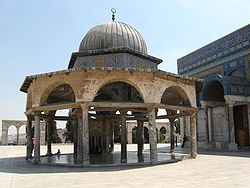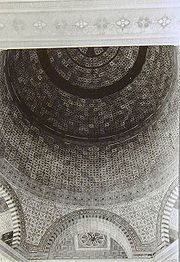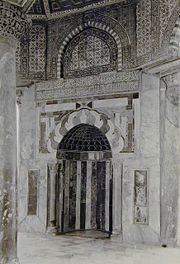
Dome of the Chain
Encyclopedia

Dome
A dome is a structural element of architecture that resembles the hollow upper half of a sphere. Dome structures made of various materials have a long architectural lineage extending into prehistory....
located adjacently east of the Dome of the Rock
Dome of the Rock
The Dome of the Rock is a shrine located on the Temple Mount in the Old City of Jerusalem. The structure has been refurbished many times since its initial completion in 691 CE at the order of Umayyad Caliph Abd al-Malik...
in the Old City of Jerusalem. One of the oldest structures on the Haram ash-Sharif (Temple Mount), it is not a mosque
Mosque
A mosque is a place of worship for followers of Islam. The word is likely to have entered the English language through French , from Portuguese , from Spanish , and from Berber , ultimately originating in — . The Arabic word masjid literally means a place of prostration...
or shrine, but is used as a prayer house. It was built by the Ummayads, became a Christian
Christian
A Christian is a person who adheres to Christianity, an Abrahamic, monotheistic religion based on the life and teachings of Jesus of Nazareth as recorded in the Canonical gospels and the letters of the New Testament...
chapel under the Crusader
Crusades
The Crusades were a series of religious wars, blessed by the Pope and the Catholic Church with the main goal of restoring Christian access to the holy places in and near Jerusalem...
s, restored as an Islam
Islam
Islam . The most common are and . : Arabic pronunciation varies regionally. The first vowel ranges from ~~. The second vowel ranges from ~~~...
ic prayer house by the Ayyubids and has been renovated by the Mamluk
Mamluk
A Mamluk was a soldier of slave origin, who were predominantly Cumans/Kipchaks The "mamluk phenomenon", as David Ayalon dubbed the creation of the specific warrior...
s, Ottomans
Ottoman Empire
The Ottoman EmpireIt was usually referred to as the "Ottoman Empire", the "Turkish Empire", the "Ottoman Caliphate" or more commonly "Turkey" by its contemporaries...
and the Palestinian
Palestinian people
The Palestinian people, also referred to as Palestinians or Palestinian Arabs , are an Arabic-speaking people with origins in Palestine. Despite various wars and exoduses, roughly one third of the world's Palestinian population continues to reside in the area encompassing the West Bank, the Gaza...
-based waqf
Waqf
A waqf also spelled wakf formally known as wakf-alal-aulad is an inalienable religious endowment in Islamic law, typically denoting a building or plot of land for Muslim religious or charitable purposes. The donated assets are held by a charitable trust...
.
History
Some structures within the dome date to pre-Islamic times, but it is widely accepted by both Arab and Western scholars that the Dome of the Chain was originally built during the Ummayad-era of rule in PalestinePalestine
Palestine is a conventional name, among others, used to describe the geographic region between the Mediterranean Sea and the Jordan River, and various adjoining lands....
, by the caliph
Caliph
The Caliph is the head of state in a Caliphate, and the title for the ruler of the Islamic Ummah, an Islamic community ruled by the Shari'ah. It is a transcribed version of the Arabic word which means "successor" or "representative"...
Abd al-Malik in 691. The Ummayad design of the building has largely remained unaltered by later restorations. In addition to being a prayer house, the dome was used as a treasury for the local Muslim
Muslim
A Muslim, also spelled Moslem, is an adherent of Islam, a monotheistic, Abrahamic religion based on the Quran, which Muslims consider the verbatim word of God as revealed to prophet Muhammad. "Muslim" is the Arabic term for "submitter" .Muslims believe that God is one and incomparable...
community.

Levant
The Levant or ) is the geographic region and culture zone of the "eastern Mediterranean littoral between Anatolia and Egypt" . The Levant includes most of modern Lebanon, Syria, Jordan, Israel, the Palestinian territories, and sometimes parts of Turkey and Iraq, and corresponds roughly to the...
in 1099, they identified the dome as the spot where Saint James was martyred and transformed the building into a chapel dedicated to him. In 1187, the building was returned to Islamic use after Saladin
Saladin
Ṣalāḥ ad-Dīn Yūsuf ibn Ayyūb , better known in the Western world as Saladin, was an Arabized Kurdish Muslim, who became the first Sultan of Egypt and Syria, and founded the Ayyubid dynasty. He led Muslim and Arab opposition to the Franks and other European Crusaders in the Levant...
recaptured Jerusalem for the Muslims. In 1199 the ceiling and pavings were renewed and marble was added to the columns by the ruling Ayyubids.
The Crusaders briefly re-used the place from 1240-1244, but they were defeated by the Mamluks. The Mamluk sultan Baibars
Baibars
Baibars or Baybars , nicknamed Abu l-Futuh , was a Mamluk Sultan of Egypt. He was one of the commanders of the forces which inflicted a devastating defeat on the Seventh Crusade of King Louis IX of France and he led the vanguard of the Egyptian army at the Battle of Ain Jalut in 1260, which marked...
renovated it and slightly reduced the number of columns in the 13th century, as well as refacing the mihrab
Mihrab
A mihrab is semicircular niche in the wall of a mosque that indicates the qibla; that is, the direction of the Kaaba in Mecca and hence the direction that Muslims should face when praying...
with marble
Marble
Marble is a metamorphic rock composed of recrystallized carbonate minerals, most commonly calcite or dolomite.Geologists use the term "marble" to refer to metamorphosed limestone; however stonemasons use the term more broadly to encompass unmetamorphosed limestone.Marble is commonly used for...
. In 1561, under the Ottoman
Ottoman Empire
The Ottoman EmpireIt was usually referred to as the "Ottoman Empire", the "Turkish Empire", the "Ottoman Caliphate" or more commonly "Turkey" by its contemporaries...
sultan Suleiman the Magnificent
Suleiman the Magnificent
Suleiman I was the tenth and longest-reigning Sultan of the Ottoman Empire, from 1520 to his death in 1566. He is known in the West as Suleiman the Magnificent and in the East, as "The Lawgiver" , for his complete reconstruction of the Ottoman legal system...
, the tiles of the mihrab were glazed and later in 1760, more tiles were added to it.
The last major renovation was undertaken by the Islamic waqf
Waqf
A waqf also spelled wakf formally known as wakf-alal-aulad is an inalienable religious endowment in Islamic law, typically denoting a building or plot of land for Muslim religious or charitable purposes. The donated assets are held by a charitable trust...
of Jerusalem in 1975-76.
Religious significance
The Dome of the Chain owes its name to an ancient legend during King Solomon's rule. According to Mujadir ad-Din,
Among the wonders of the Holy House is the chain, which Solomon, son of David, suspended between Heaven and Earth, to the east of the Rock, where the Dome of the Chain now stands. The chain had one characteristic. If two men approached it to solve a point of litigation, only the honest and upright man could take hold of it; the unjust man saw it move out of his reach.
The building in Islam
Islam
Islam . The most common are and . : Arabic pronunciation varies regionally. The first vowel ranges from ~~. The second vowel ranges from ~~~...
ic tradition is the spot where Judgment Day will occur in the "end of days" and where a chain will stop the sinful and let the just pass through. Notably, the mihrab in the al-Aqsa Mosque
Al-Aqsa Mosque
Al-Aqsa Mosque also known as al-Aqsa, is the third holiest site in Sunni Islam and is located in the Old City of Jerusalem...
is located exactly in the middle of the qibla
Qibla
The Qiblah , also transliterated as Qibla, Kiblah or Kibla, is the direction that should be faced when a Muslim prays during salah...
wall of the Temple Mount on north-south axis with the Dome of the Chain.
Architecture

Timber
Timber may refer to:* Timber, a term common in the United Kingdom and Australia for wood materials * Timber, Oregon, an unincorporated community in the U.S...
and is supported by six columns, enclosed by a wall-less roof. The roof is situated atop of eleven columns supported by a polygonal outer arcade. The plan of the structure is a triangular base with two inter-columnar spaces of the inner drum which correspond to three of the outer polygons on the northeastern and northwestern sides. The qibla wall contains the mihrab or prayer niche and is flanked by two smaller columns.
There are a total of seventeen columns in the structure, excluding the mihrab, versus the original amount which was twenty. The Dome of the Chain has a diameter of 14 metres (45.9 ft), making it the third largest building on the Haram after the al-Aqsa Mosque
Al-Aqsa Mosque
Al-Aqsa Mosque also known as al-Aqsa, is the third holiest site in Sunni Islam and is located in the Old City of Jerusalem...
and the Dome of the Rock.
Dome of the Rock model
According to a number of early ArabArab
Arab people, also known as Arabs , are a panethnicity primarily living in the Arab world, which is located in Western Asia and North Africa. They are identified as such on one or more of genealogical, linguistic, or cultural grounds, with tribal affiliations, and intra-tribal relationships playing...
historians, the Dome of the Chain (excluding its outer wall) was used as a model for the Dome of the Rock
Dome of the Rock
The Dome of the Rock is a shrine located on the Temple Mount in the Old City of Jerusalem. The structure has been refurbished many times since its initial completion in 691 CE at the order of Umayyad Caliph Abd al-Malik...
. Like the latter, the Dome of the Chain has two concentric polygons, with pillars bound together by a wooden beam and supporting arcades. The Dome of the Rock is three times the size of the Dome of the Chain and the ground plan and height are proportional.

